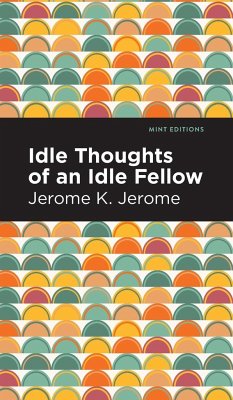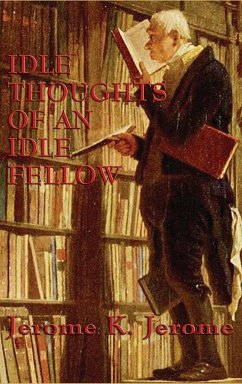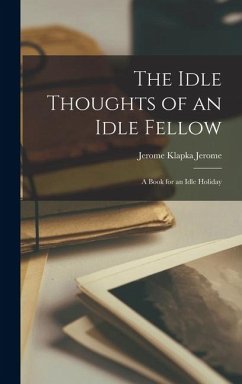
Second Thoughts of an Idle Fellow
Versandkostenfrei!
Versandfertig in 1-2 Wochen
16,99 €
inkl. MwSt.
Weitere Ausgaben:

PAYBACK Punkte
8 °P sammeln!
Featuring twelve simple yet profound essays, Jerome K. Jerome's Second Thoughts of an Idle Fellow is a humorous and clever collection. Each essay is crafted around a timeless and relatable issue, such as the unfortunately common inability to make decisions. On the Art of Making Up One's Mind observes this to be a common practice. Beginning with the story of a young woman who cannot decide what color of garment to buy, this essay takes notice of the everyday day occurrences of this struggle, comparing the experience for men and women. As a common theme in the collection, societal expectations a...
Featuring twelve simple yet profound essays, Jerome K. Jerome's Second Thoughts of an Idle Fellow is a humorous and clever collection. Each essay is crafted around a timeless and relatable issue, such as the unfortunately common inability to make decisions. On the Art of Making Up One's Mind observes this to be a common practice. Beginning with the story of a young woman who cannot decide what color of garment to buy, this essay takes notice of the everyday day occurrences of this struggle, comparing the experience for men and women. As a common theme in the collection, societal expectations and assumptions about gender play a main role in many of the essays, tackling topics such as relationships and dating. However, other essays focus on the universal experience of being human, separate from implications of gender. This is portrayed in On the Exceptional Merit Attaching to the Things We Meant to Do through the narrative of a failed craft. Despite shortcomings, pride always finds a way to warp reality, which is why Jerome ironically warns against taking advice in the essay On the Inadvisability of Following Advice. With discussions of pride, intention, vices, and ideals, Second Thoughts of an Idle Fellow addresses the truths of topics that are simultaneously overlooked, yet universally experienced. With satirical prose and thoughtful reflection, Jerome K. Jerome combines humor and sentiment in Second Thoughts of an Idle Fellow, presenting serious topics without intimidation, inviting thought and laughter. Though first published over one-hundred years ago in 1898, Second Thoughts of an Idle Fellow feature timeless and universal themes and realizations that remain to be clever and relevant to modern-day society. This edition of Second Thoughts of an Idle Fellow by Jerome K. Jerome is presented in an easy-to-read font and features an eye-catching new cover design. With these accommodations, this edition is accessible and appealing to contemporary audiences, restoring Jerome K Jerome's work to modern standards while preserving the original wit and charm of Second Thoughts of an Idle Fellow. Since our inception in 2020, Mint Editions has kept sustainability and innovation at the forefront of our mission. Each and every Mint Edition title gets a fresh, professionally typeset manuscript and a dazzling new cover, all while maintaining the integrity of the original book. With thousands of titles in our collection, we aim to spotlight diverse public domain works to help them find modern audiences. Mint Editions celebrates a breadth of literary works, curated from both canonical and overlooked classics from writers around the globe.













